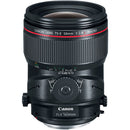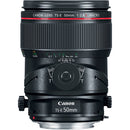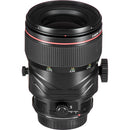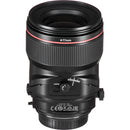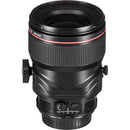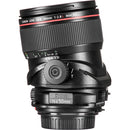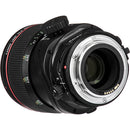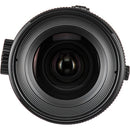Characterized by its close-focusing and perspective control capabilities, the TS-E 50mm f/2.8L Macro from Canon is a normal-length tilt-shift lens well-suited for product, tabletop, architectural, and interior photography. Up to +/- 8.5Á of tilt is possible, for focus control, and +/- 12mm of shift, to adjust perspective and composition, and a tilt-locking mechanism can be used while shooting for more stability. A minimum focus distance of 10.6" and a maximum magnification of 0.5x are also benefitted by the range of movements for more control over depth of field when photographing close-up subjects.
Complementing the operation of the lens, this L-series prime is also distinguished by its optical design that features a pair of Ultra-Low Dispersion elements to significantly reduce color fringing and chromatic aberrations as well as one aspherical element to minimize spherical aberrations and distortion. Individual elements also feature both Air Sphere and Subwavelength Coatings to suppress flare and ghosting for greater contrast and color neutrality.
Perspective control, tilt-shift lens affords +/- 12mm of shift and +/- 8.5Á of tilt, and both types of movements can be applied independently, and parallel or perpendicular to one another. Additionally, the tilt and shift functions can be rotated +/- 90Á in any direction for applying the movements in distinct directions.
Tilt-locking mechanism and a large tilt knob benefit operation and ensure the lens stays in place while shooting.
Two ultra-low dispersion elements help to reduce color fringing and chromatic aberrations for improved clarity and color accuracy.
One aspherical element minimizes spherical aberrations and distortion for improved sharpness.
Both Air Sphere and Subwavelength Coatings have been applied to lens elements to minimize surface and internal reflections for a marked reduction in lens flare and ghosting when working in strong lighting conditions.
A minimum focusing distance of 10.6" along with a maximum magnification of 0.5x benefits working with close-up subjects.
Rounded nine-blade diaphragm contributes to a pleasing out of focus quality that benefits the use of shallow depth of field techniques.









